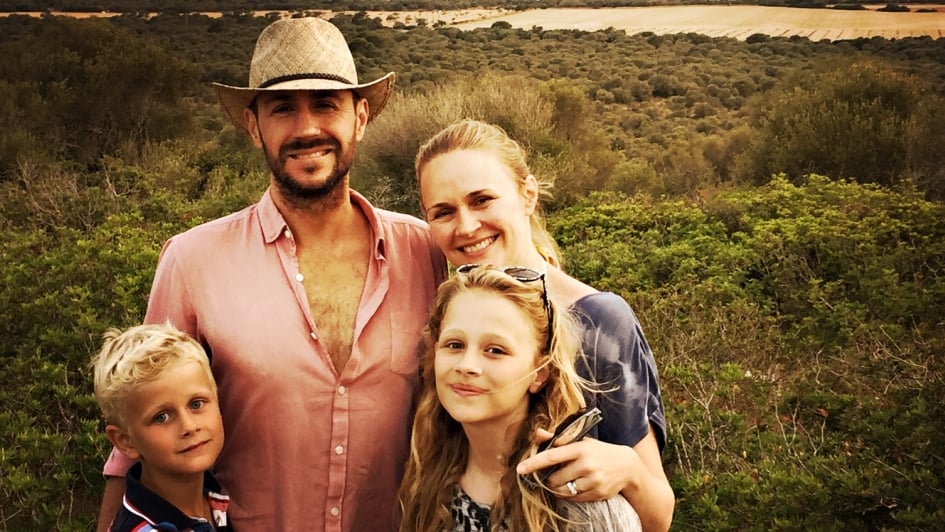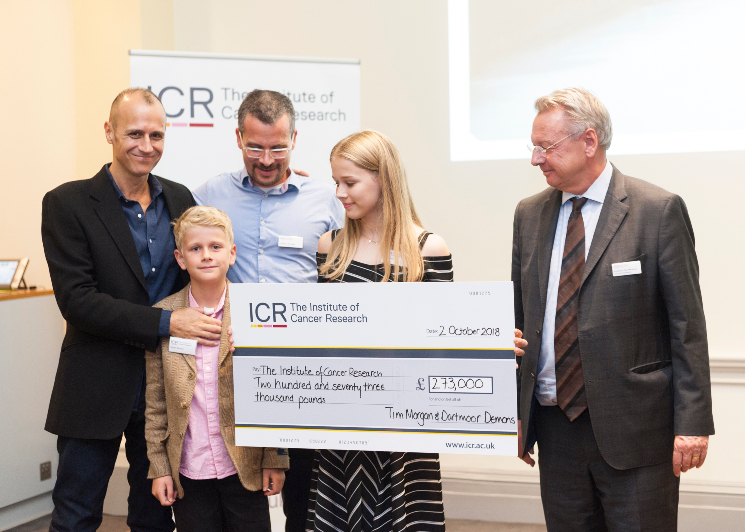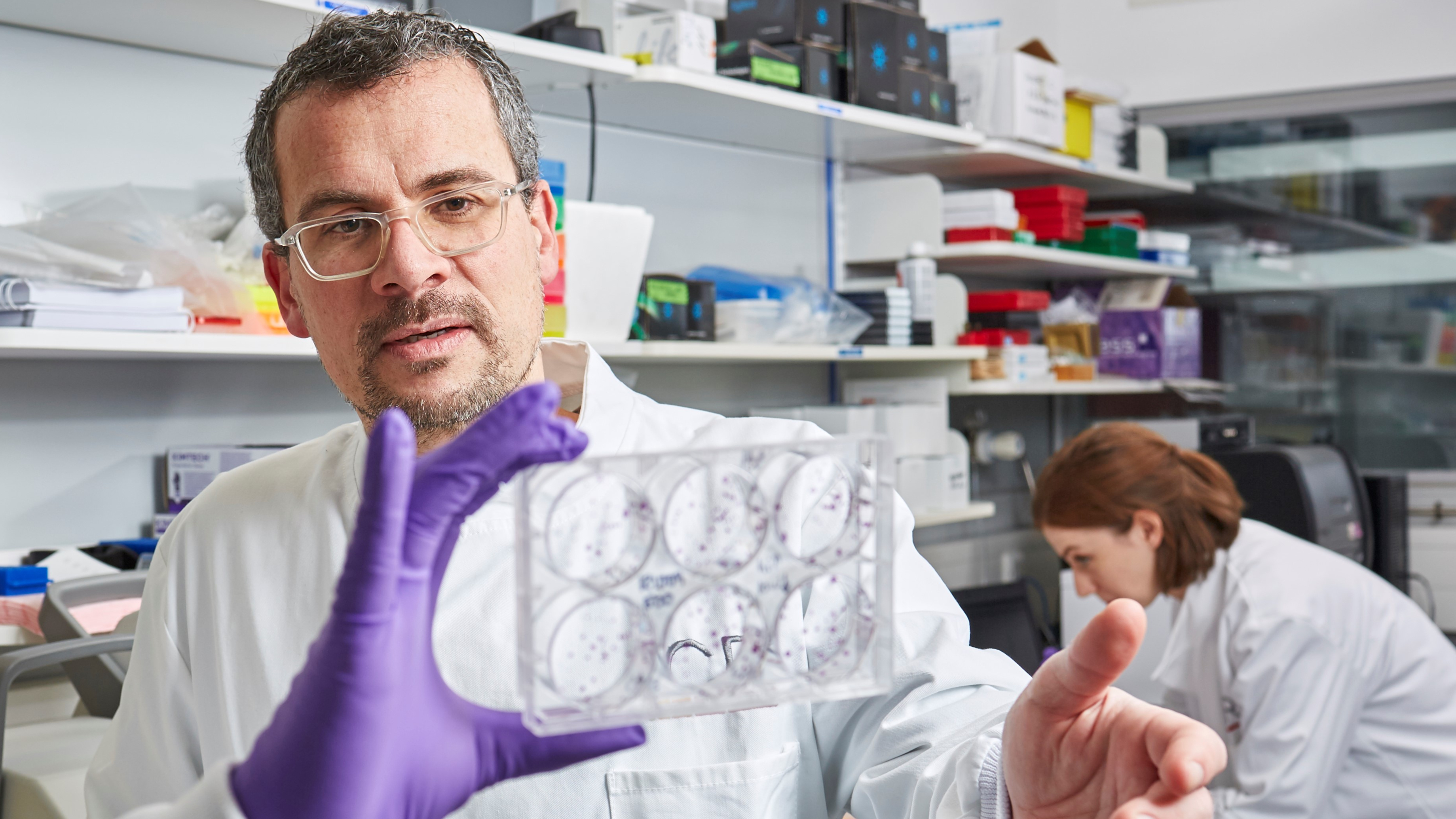
Tim Morgan and his family Credit: Hilary Morgan
When I first met Tim Morgan, a cancer patient in his 40s, I was struck by his incredible bravery, his love for his beautiful family and his commitment to do whatever he could to support our research into new treatments.
By the time Tim was diagnosed with bowel cancer in 2015, it was already advanced. His daughter Molly was 10 and his son William was just six. He underwent several rounds of chemotherapy and radical surgery and targeted treatments. This gave him precious extra years with his family. Tim also dedicated time and energy to fundraising for Dr Marco Gerlinger’s research into new treatments, so other patients would have a better chance of surviving their cancer.
I was overwhelmed at Tim’s generosity in the face of great adversity – even while undergoing treatment, he took on a gruelling 90km cycle challenge across Dartmoor with an intrepid team of family and friends, raising hundreds of thousands of pounds for us. Despite the unfairness of his own situation, his thought was to help other families and do something to avoid them going through the same thing.
Unfortunately, after four years, Tim’s treatment eventually stopped working and he died aged 48.

Tim Morgan presents a fundraising cheque to Dr Marco Gerlinger and Professor Paul Workman following his cycle challenge
The urgent need for new treatments
Sadly, Tim’s story is not unusual – bowel cancer is the second biggest cause of cancer death in the UK and the frequency of the disease in patients under the age of 50 is increasing. I know another family who are local to me and living through a very similar story: My friend, a father in his forties has been undergoing extensive treatment for advanced bowel cancer. Like Tim, his family are young, and his youngest isn’t yet of school age.
This is why we urgently need smarter, better ways to treat bowel cancer – so people like Tim and my friend can live long and happy lives, see their children grow up, care for their elderly parents and grow old with their partners.
We know that one of the biggest challenges in cancer research is cancer’s ability to evolve and adapt to evade treatment, meaning as Tim experienced, drugs that are initially highly effective, often stop working after a few months. At The Institute of Cancer Research, London (ICR), Dr Marco Gerlinger is developing better immunotherapy treatments for bowel cancer patients, to outsmart cancer and cut off the routes that tumours use to evade treatment.
As a charity, the ICR relies on fundraising and philanthropy to fund research like Dr Gerlinger’s. We have been very fortunate that over the years, the generosity of our supporters has played a key role in the progress we’ve made so far. But there is still much more that needs to be done, to help families facing cancer.

Dr Marco Gerlinger in his lab
Commit to a cause and carry on giving
Recently I read in the charity press that the UK has fallen out of the top 20 countries for charitable giving. Though I’m not disputing the data, I find that hard to believe, as we have such a long tradition of charity supporting vital causes like cancer research. Giving is such an intrinsic part of British culture. Surely we are not withdrawing our support now, as we emerge from the coronavirus pandemic and good causes need us most?
We’ve seen so many fantastic examples particularly over the past 18 months, of how during adversity, we come together to help those who need support the most – when times are tough, our values of kindness and generosity shine through. Whatever the cause – be it poverty, mental health, or overseas aid, I believe it’s important for us to remember these values and hold them close. Commit to a cause and carry on giving. It’s what a civilised society is built upon.
My cause is cancer research – and more than anything, I want to see a time when we don’t have to fear the ‘big C’ and patients can go on to live good and full lives together with their families. Your generosity means we are getting closer to this reality, giving the gift of time and hope to patients who previously had neither.
Just prior to publishing this article, my friend died of bowel cancer. My heart bleeds for his family. My head tells me to keep fundraising and trust that our research will win through for other patients like him.
Please donate today to help us deliver urgently-needed smarter treatments for bowel cancer and give patients like Tim and my friend a chance to finish what they started. Let’s finish cancer together.
Support our work